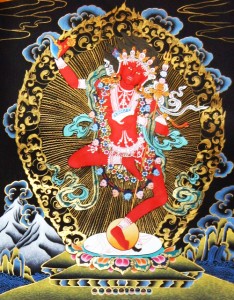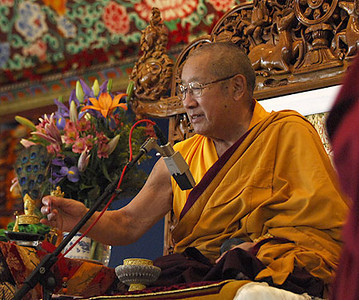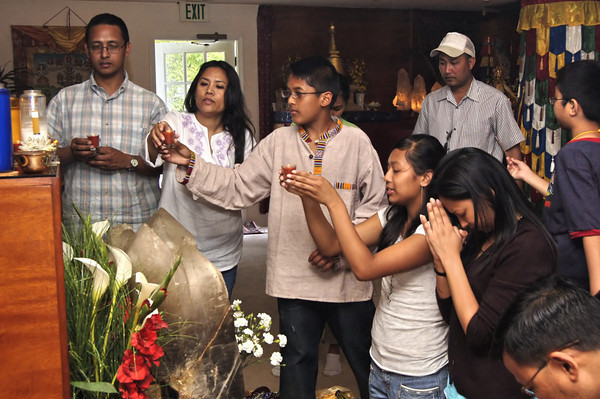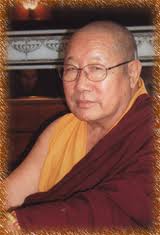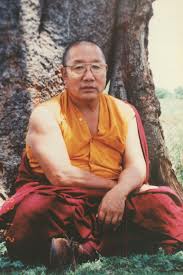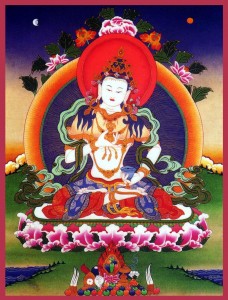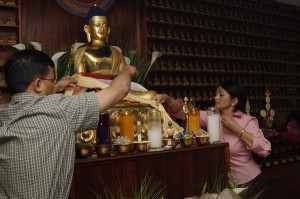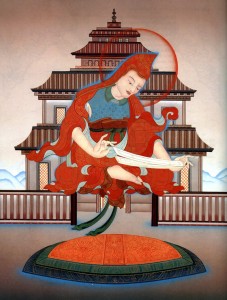The following is adapted from an oral commentary given by His Holiness in conjunction with a ceremony wherein he bestowed the bodhisattva vow upon a gathering of disciples at Namdroling in Bozeman, Montana, November 1999:
[The second way to adjust one’s intention in order to be in harmony with the special feature of this instruction is through] developing attraction to enlightenment. According to this tradition, what leads one to develop an attraction to enlightenment is the cultivation of love for all beings, which begins by contemplating the suffering of cyclic existence and then cultivating repulsion and weariness [toward that existence].
Think about all living beings that at some time or another, throughout the course of innumerable past lifetimes, have been your own kind father or mother. Consider how a mother will anything for her child–even give her own life, without hesitation. Consider how all living beings have been that kind to you at some time in the past–not just once, but countless times, in countless different circumstances and situations over the course of countless lifetimes since beginningless time. Consider also that to not think carefully about repaying this kindness, and thereby to go through your life without the intention to truly benefit parent sentient beings, and so to actually ignore them, is truly shameless.
Many people in the West may think, “Wait a minute! My parents were not very kind to me. In fact, we are not even close, and I don’t even like them, so why should I feel that I need to repay their kindness now?” If that is what you think, then take a moment to think about how you acquired your body. Is it not due to the kindness of your parents that you have your precious human body? From the time your consciousness entered the union of your father’s seed and your mother’s egg, your mother carried you in her own body. Her body nurtured you as you grew within it. Then with pain and difficulty she gave birth to you. Her kindness did not just stop there: for many years she cared for you and lovingly fed, cleaned, clothed, and wiped you; she provided shelter and cared for you when you were sick, and thus she protected you and looked out for you constantly. If you think you don’t need to repay the kindness of your parents, just remind yourself of those events, which you were the recipient of time and time again.
If that still does not change your attitude, so that you still do not understand the kindness your parents showed you, then think about your body, the gift of your body, which is who you are; your parents gave you that. Because your parents showed you the great kindness of giving you your body, your precious life, here you are. Sure you had the causes for your precious human rebirth, but without parents you wouldn’t have your body. And if you didn’t have your body, you wouldn’t be able to receive these vows.
In our present state of ignorance, we have an inability to recognize that all beings have been our parents in the past, and we certainly don’t know what the particular situations and circumstances of those lifetimes were. Nonetheless, it is certain that we have had countless sentient beings as our parents over and over again in countless past lives. The truth is, at the present time we just do not recognize that.
Imagine you are on the bank of a river with your mother and suddenly she falls in and is being carried away by the rushing water. There you stand on the bank, watching that happen. What would you do? Would you do something to try to save her, such as throw out a rope? Or would your turn your back and walk away rather than risk your own life? Would you be concerned for her, or would your concern be only for yourself? The intention of hearers and solitary realizers can be likened to the later case, while the intention of Mahayana practitioners can be likened to the former. While it is important to develop attraction toward peace, you should never, for any reason, be attracted to the quiescence of the hearers and solitary realizers.

